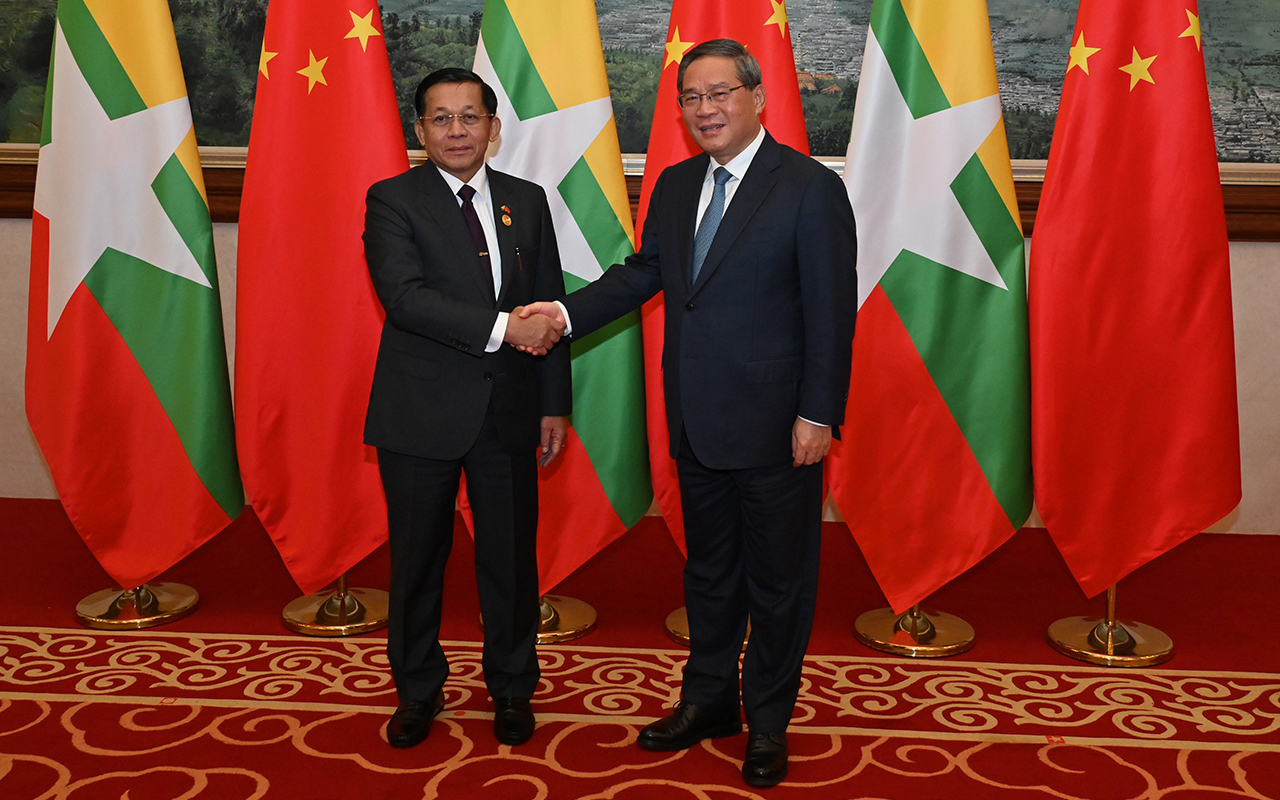General Min Aung Hlaing in China for talks over projects, elections and rare earths (with militias)
Myanmar’s military strongman met with Chinese Premier Li Qiang during a two-day summit of the Greater Mekong Subregion. Chinese source stresses infrastructure projects undermined by the civil war, noting that Beijing has also held discussions with the militias that control the borders and the rare earth trade.
Yangon (AsiaNews/Agencies) – For the first time since civil war broke out in 2021, the head of Myanmar’s military junta, General Min Aung Hlaing, travelled to China; the occasion was the Greater Mekong Subregion Economic (GMS) Summit, which provided him with an opportunity to meet Chinese Premier Li Qiang and discuss his country’s ongoing civil war.
On Tuesday, accompanied by officials and business executives, the general, who led the military in deposing democratic leader Aung San Suu Kyi, landed in Kunming, Yunnan province, which shares a border with Myanmar, for the regional gathering, also attended by the leaders of Laos, Cambodia, and Vietnam.
After ethnic militias launched an offensive a year ago to capture border areas with China, fears spread in the ranks of Myanmar’s armed forces that Beijing would stop supporting them. In fact, China continues to provide military support to the ruling junta, but it also has influence with some of the armed groups in the resistance, especially those operating along the borders.
Beijing’s main interest remains its projects and investments in the Southeast Asian country.
“China supports Myanmar in advancing the political reconciliation and transformation, and stands ready to work with Myanmar to steadily advance the construction of the China-Myanmar Economic Corridor under the framework of high-quality Belt and Road cooperation," Li is quoted as saying on the State Council website.
The premier urged “both sides to strengthen cooperation in education, culture and tourism, enhance local exchanges, and jointly crack down on cross-border crimes such as online gambling and telecom fraud”.
Online scams, which proliferate along the border, are an important issue that Beijing wants the military junta to act upon.
For its part, “Myanmar will work with China for assistance in economic and technology, as well as the enhancement of collaboration and energy security, aiming to develop the country. The Muse-Mandalay-Kyaukpyu railway road project will start in possible areas,” wrote The Global New Light of Myanmar, a government-owned newspaper, referring to what General Min Aung Hlaing said about a Chinese project that is part of its Belt and Road Initiative.
The project is expected to connect the city of Kunming (which hosted the summit) to the port of Kyaukpyu, where an oil pipeline allows China to import oil from Middle Eastern countries avoiding the Strait of Malacca.
With the completion of the railway, other goods will also be able to flow into China by a shorter route.
Only the government paper mentions peace talks with the three militias (MNDAA, TNLA and AA); the latter launched an offensive against the military, and are blamed for violating the ceasefire achieved in January with Chinese mediation.
“The door of peace is always open if they genuinely want peace,” reads the article. “The armed insurgents should do what needs to be done instead of giving priority to their needs and wishes. Moreover, the MNDAA, TNLA, and AA should have clear and specific actions for peace so that dialogue can materialize.
“Stability and development in border areas are crucial for regional and State development, and only stability can promote cooperation in economy and trade. Therefore, illegal trading, the central pillar of armed insurgents in borders, should be wholely (sic) eradicated. Border trade plays a vital role, whereas yuan-kyat direct payment is in operation.”
The piece also mentions Chinese support for the elections that the junta plans for next year, although it is not clear how they will take place since the military controls only part of the country’s territory.
Resistance groups have, instead, focused on seizing strategic cities with mining operations, which, in many cases, help fund the regime.
The TNLA seized the mining town of Mogok, near Mandalay, while earlier this month the Kachin Independence Army (KIA) (another militia fighting the junta) captured Chipwi and Tsawlaw, rich in rare earth deposits exploited by local ethnic groups and China.
The KIA also occupied the city of Pangwa after its political representatives met in mid-October with China's special envoy for Asian affairs, Deng Xijun, who reportedly urged the militia to end resistance against the military regime.
After the request was turned down, China blocked exports passing through KIA-controlled areas, where it set up a team to manage mining operations.
Myanmar ranks third in the world for rare earth mining after China and the United States. The Southeast Asian country, however, lacks processing capacity, so most ore, in particular what is needed to make electric cars, is sold to Chinese companies.
According to Global Witness, rare earth exports from Myanmar to China rose from 19,500 tonnes in 2021 to 41,700 tonnes in 2023.
In August last year, when tin mining operations were halted in Wa State, prices rose. Several experts fear that prolonged disruptions in trade in other important minerals could cause problems for Chinese production and encourage Beijing to intervene more in Myanmar just to ensure that economic activities continue.
04/05/2021 16:15
07/09/2021 12:36
20/04/2021 11:58
15/12/2021 12:59







.png)










